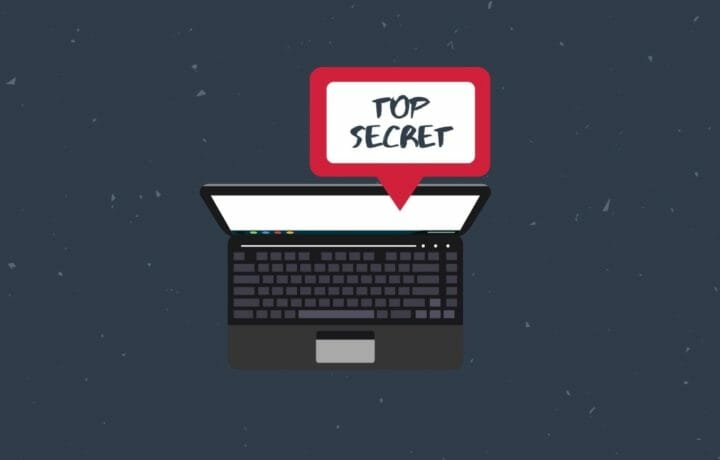Teleworking with a security clearance is a complicated business. The good news is that it is possible! The bad news is that if you get it wrong, you risk being arrested, having your home raided by the FBI, and then going to prison. No pressure—it can’t be that hard to follow government regulations, right? Oh, right.
The big rule—the thing you cannot forget under any circumstances—is that classified material must remain on official, secure computers in official, secure facilities. There’s just no getting around that. No matter how flexible your office’s telework policy, it is never OK to work on classified material from lap desk in your bed (unless you live in a SCIF). If you absolutely, positively feel the need to try your luck, you might first want to speak with John Deutch. While serving as Director of Central Intelligence, he was given a personal laptop to do unclassified work from home. This did not work out well for him. After serving his term, the CIA collected his laptop and discovered 31 classified documents on it. Though he was not prosecuted (you don’t put the former head of the CIA on the stand and ask him to tell “the whole truth and nothing but the truth”), he was stripped of his security clearance.
Because you were never the head of American intelligence, that is the absolute best case you could expect from similar infractions.
WHERE DID THIS COME FROM?
Congress and the president pressed the issue of teleworking with the Telework Enhancement Acts of 2010 and 2012. The guidance mandated that federal agencies find ways of facilitating telework to help with employee retention, to facilitate continuity of government (e.g. bad weather or atomic bombs or both make it impossible to drive to the office), and to help improve worker quality-of-life (e.g., sometimes you must stay home with your sick child, and it’s wrong to penalize a parent for doing so). Agencies have made great strides in implementing the policy, though per the OPM’s 2014 report to Congress on the status of telework (the most recent version that is publicly available), “cultural resistance” to telework is pervasive across the federal government, and “many managers are still not comfortable managing employees remotely.”
Note that the Telework Enhancement Act applies only to federal employees—not contractors (though no law prohibits contractors from telecommuting).
SHOULD I BE AFRAID OF THIS?
The thing to know about working with sensitive (not classified!) material in a non-office environment is that it’s not an issue exclusive to the clearance community. Every major corporation has trade secrets that must be guarded carefully, and teleworkers who fail to do so will soon find themselves without a job. Such concerns aren’t even limited to corporations. In fact, they are practically ubiquitous, and you deal with them every day. You already protect such things as checking accounts, whose details and login credentials must remain safe. A common-sense security mindset is paramount. In other words, don’t write your computer password on a sticky note and paste it near the keyboard! If you’re working from the coffee shop, lock your screen before stepping away. Don’t open mystery files you receive by email. Don’t visit shady websites (e.g. porn or torrents) on business machines. You know these things.
Considering the level of risk you accept by teleworking, should you be afraid? Not at all. In fact, if you have a government or company-issued smartphone, you are basically telecommuting (at least in part) already. As such, you are already familiar with compartmentalizing, so to speak, the open and the secure when away from the office. TPS reports, calendaring, telecoms, and routine email? Go for it, all the while maintaining that crucial prison-repelling air gap between the classified computer and your take-home or personal one. Never the twain shall meet, whether by flash drive or retyping.
WHAT ARE YOUR OTHER OPTIONS?
You do have options for doing telework involving classified material, though they are limited at present. The Defense Department provides for “work at an approved alternative secure location… contingent on individual DoD Component requirements regarding such work, when situations warrant.” One such “alternative secure location” (for the intelligence community, at least) is the secure telework center in Woodbridge, Virginia. Whether such secure centers proliferate across the country remains to be seen. There’s no reason they shouldn’t: telework centers for unclassified work have been available for federal employees since the 1990s. How fast such centers open, however, is limited to the glacial speed of government action.
To stay up on the rules and options with respect to telework, the Office of Personnel Management offers online training courses. Employees can take the course here. Managers have a separate one, here. (An email address associated with the federal government is required.) And when in doubt, ask. If you are a federal employee, you can find your telework coordinator here.



